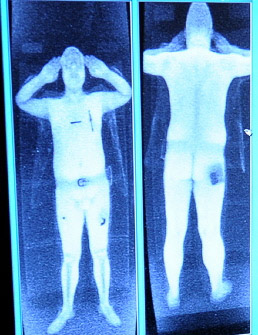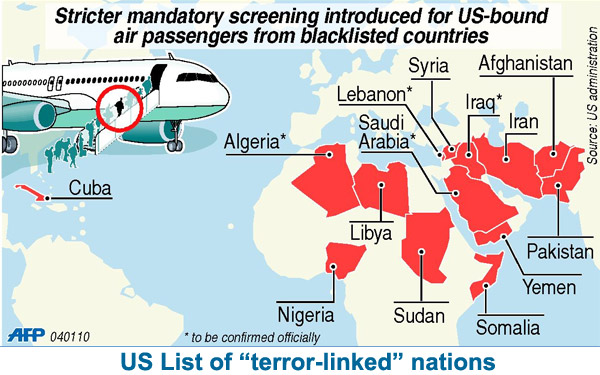"World terror watch lists flawed" -Biometrics will 'help tighten up the system'.
Source: khaleejtimes.com
Around the world, watch lists are a key tool against terrorism — but highly imperfect.Experts say simple issues like fickle spelling and incomplete data, as well as deliberate deception and uncooperative countries, all make it possible for a determined terrorist like bomb suspect Umar Farouk Abdulmutallab to slip across borders.
British officials are proud of their list, which contains more than 1 million names, including that of Abdulmutallab. That didn’t stop the young Nigerian boarding a flight from Amsterdam to the United States with explosives in his underwear — a stark reminder of the perils of flawed information-sharing and the limits of watch lists.
“Lists are valuable in making sure governments around the world are able to track individuals,” said John Harrison, an aviation security specialist at Singapore’s S. Rajaratnam School of International Studies. “But you don’t want to put too much emphasis on these lists. It’s an overstatement to say: ‘OK, now we are safe.”’
Analysts say human intelligence, information-sharing and data analysis are also vital to stopping terrorists, and Britain has announced an urgent review of its watch list system in the wake of the Christmas Day attack over Detroit.
The British list holds the names of everyone from suspected terrorists and radical clerics to wanted criminals and rejected visa applicants — like Abdulmutallab, who was added after being denied a student visa in May 2009 for listing the name of a bogus college on the application.
The list is the centerpiece of a program called E-borders, which will eventually check all passengers traveling to or through Britain against the master list. Information comes from police, intelligence services and other sources and is held by the U.K. Border Agency.
Home Secretary Alan Johnson said this week that the list had led to almost 5,000 arrests since 2005 — mostly for crimes such as murder, rape and assault rather than terrorism — and prevented 65,000 people entering Britain in 2009.
“In some countries, there are separate watch lists for security, for policing and crime, for people who have lost their passports and for immigration issues, but an integrated watch list serves us well,” Johnson told lawmakers in the House of Commons.
Magnus Ranstorp, a terrorism expert at the Swedish National Defense College, said the British system was an effective deterrent. In the U.K., he said, every passenger coming into the country is scrutinized.
“Even if you are in transit, and never meet a border guard, it’s a hostile environment if you’re flying through the U.K,” he said.
The list has its limits, though. Names on it are not automatically shared with other countries, although those on a smaller terrorism-related watch list are.
U.S. authorities have said Abdulmutallab was in a database of 500,000 people suspected of terrorist ties, but not on a no-fly watch list. Britain has said it had no indication the Nigerian was planning an attack, and did not flag him to U.S. officials as a particular threat.
On Thursday, Obama announced about a dozen changes designed to fix the system that let Abdulmutallab slip through, including an overhaul of the nation’s terrorist watch lists.
Alain Chouet, former chief of the security intelligence service at France’s counterintelligence agency, estimated that lists he saw when working in intelligence were only about “10 percent viable.”
“The identity of people outside the European tradition is vague. People can change their names, and there is the problem of transcription into European alphabets,” he said.
He used the example of the name Mohamed, which can have different spellings in English, French or Polish.
Even passport numbers are only partially viable since passports can be tampered with, or people can get passports from other countries.
 And some countries are more cooperative than others. European Union nations and close allies like the U.S. routinely share information.
And some countries are more cooperative than others. European Union nations and close allies like the U.S. routinely share information.“It is outside Europe that we have the problem,” Britain’s Johnson noted this week.
The Home Office declined to name any uncooperative nations, but said biometric data such as fingerprints, which are being introduced on passports and required from all visa holders, would help tighten up the system.
Experts agree that biometrics, which includes physical traits like face recognition, are key to ensuring names on a watch list can be matched to a real individual.
“It’s very difficult to fake, and the governments have begun collecting that information massively,” said Ranstorp.
Around the world there are multiple — and often overlapping — watch lists. In addition to national lists, Interpol established a Terrorism Watch List in April 2002 in response to the Sept. 11, 2001 attacks. The list can be viewed by personnel of the international police agency and by authorized police forces in about 180 countries.
It scored a success in November when authorities in Indonesia were tipped off about Abdul Basir Latip, a suspected al-Qaida-linked militant from the Philippines. Acting on a tip from Interpol, which was sharing information from a U.S. watch list, officials nabbed him Nov. 21 at Jakarta’s international airport. He had arrived from Syria using a fake passport.
This kind of effective coordination is more critical to successful security, analysts said, than the watch lists themselves.
Rolf Tophoven, director of the Germany-based Institute for Terrorism Research and Security Policy, said the bloated U.S. bureaucracy was to blame for intelligence failures in the Christmas Day bombing attempt. Leaner intelligence services have proven much more effective because there is better communication, and information is less likely to fall through the cracks, he said.
“Look at the Israeli intelligence services and their effectiveness countering terrorism and I think you can take one lesson — small but effective,” he said.
Harrison, the aviation security specialist, said Abdulmutallab’s behavior should have set off alarm bells, even if his name on a list did not.
Abdulmutallab apparently bought his ticket in cash, was flying the same day, had no check-in luggage and purchased a one way fare.
Any of those details — and certainly the sum — should have tripped a standard international security procedure, Computer Assisted Passenger Screening or CAPS, Harrison said.
“This case seems more to have been failure, not of lists, but a failure on the human side of intelligence, accurately assessing the threat and tracking the information to see if there were any links,” he said. “It was an analytical failure.”

RedIce Radio:
Charles Farrier - No CCTV, Campaign Against Big Brother Camera Surveillance
Kyle Hunt - The Gods of Technology
Nick Rosen - Going Off-Grid, How to Escape the Big Brother System
Aaron Franz - The Age of Transitions
John Harris - Illusion, Common and Commercial Law & the Ego
Alan Watt - Surveillance, Science & The Grid of Control
Brian Gerrish - Common Purpose & Neuro Linguistic Programming
David Icke - 'Big Brother' By-Election






















